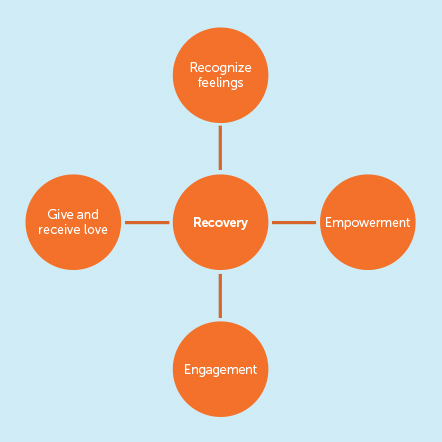Reprinted from the The Ongoing Journey of Recovery: Recovery across the lifespan issue of Visions Journal, 2025, 20 (3), pp. 29-31

I have been living with my mood disorder for 20 years. I have had multiple hospitalizations and community residential mental health stays. I also accumulated debt when unwell. I never would have expected how my life would turn out.
Thankfully it’s been nine years since I’ve been hospitalized. I’ve received excellent care at a short-term residential mental health care facility. It’s more like a home environment than the hospital. It has produced healing and a return to wellness, which I am always grateful for.
Over time I have also been able to put debt payments onto my mortgage payments, and this has worked very well. I now have a good sum of money in my bank account every month, and I never want to go back to where things were previously.
Is this recovery? It is for me, for now.
Recovery across the lifespan
As I look back, my mood disorder likely started at a younger age. I had an episode of depression as a teenager and mild mood fluctuations in my 20s. Still, I was able to have a successful career until things drastically changed in my early 30s and I had my first hospitalizations.
Since then, over the past two decades, I’d say the experience of my mood disorder has been continuous. I often look and sound better on the outside than I feel on the inside. It’s a complex disorder because of how often my mood cycles.
But I know I am in recovery. I’ve seen my GP just recently, for example, due to a flareup. My GP will then talk to my psychiatrist. They work together with me. I get an excellent level of care. It’s a collaborative effort. They’re always there for me. My psychiatrist is very cautious about medication dosing to limit side effects while still getting a therapeutic dose.
It’s been a steady process—it must be because of my faith and support from others who have helped me to this phase of recovery. I am grateful for the times in between my episodes when I’m well overall. It is during these times when I function well and fully engage with others and my community.
Changing concerns
How do we define recovery? The online dictionary defines it as: “A return to a normal state of health, mind, or strength.”1 Recovery is often thought to describe a person who aims to recover from their illness. While this is a good goal to have, in my opinion, a person cannot recover from their illness, but can recover from an episode of their illness.
If you have a chronic condition like I do, recovery is always a process. When I’m well, I’m very well. A good day includes volunteer work, lunch or coffee with friends and maybe getting a walk in when I have my energy. My wellness is a collaborative effect: I manage on my own, but I have excellent doctors.
I have found that working with my health care team has been very beneficial, especially when I’m unwell. Whether I’m well or unwell, they’ve gone beyond the call of duty when needed.
Concerns and hopes for the future
My doctors are approaching retirement age. I’m not sure what will happen to my care in the future. Will I get the same level of care? When I project ahead to 10 years from now, I also have other worries: what if my medication stops working. I’ve used up so many options. That scares me about the future. What if treatment doesn’t work anymore?
On the other hand, I have hopes for my future. My hopes are that my cycles might not continue at the same speed. Not that anything is perfect, but when I’m well, I have a great level of functioning.
Supports can look different for each of us. I’m grateful for the friends and family I have in my life. I’m also involved with two supportive Christian communities of faith. I attend services, we have lunches and I’m likely going to be making pastoral care phone calls to people soon. I’m always made to feel welcome and involved in the life of the church, regardless of having a mood disorder. This has been such a blessing in my life, as it’s not always the case for others.
Another aspect of wellness is the retreat centre I go to a few times a year. It’s restful, relaxing and spiritually uplifting and supportive. I always enjoy my time there and definitely benefit from all it offers me. I’m very grateful for the retreats I’m able to have there.
I also recently did a workshop on spiritual gifts. We took a questionnaire that reveals your specific gifts. Mine were healing, mercy and hospitality. I’m hoping to use some of my spiritual giftings to integrate into the life of the church.
As I will never recover from my illness, I’m thankful for my well periods between episodes. I will do my best to strive for and maintain wellness whenever possible. Recovery will look different for each person and that’s OK.
Related Resources

Recently, I spoke by phone with a close friend. We brainstormed on what recovery means.
This graphic shows my thoughts on recovery. Each arm reveals how we can learn from our experiences and strengths living with a mental health condition, and each includes more elements of recovery.
Engagement can include: time with family and friends, counselling, exercise, relaxation, resources, hobbies, meaningful volunteer work and collaboration with healthcare providers.
Recognizing feelings means we might: ask for help if needed, reach out to friends and health care professionals, keep a journal of experiences and try not to allow negative feelings overwhelm us.
Empowerment means we can: be ourselves, focus on our strengths and share our story with others.
Love means to: give and receive love when we can, and do things that give you love, and that we love.
About the author
Kathy is in her early 50s and lives with a mood disorder. She is a passionate advocate for those living with mental health conditions. Kathy engages in meaningful volunteer work and is thankful for her family and many supportive friends of all ages. She lives in the Lower Mainland
Footnotes:
-
Oxford Languages (online, via Google.com). (2025). Definition of “recovery.”
